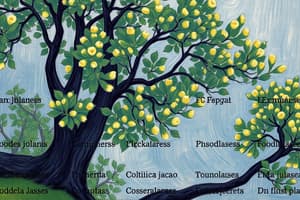Podcast
Questions and Answers
Which of the following is the Spanish word for the color 'red'?
Which of the following is the Spanish word for the color 'red'?
- Azul
- Rojo (correct)
- Verde
- Amarillo
The Spanish word for 'Monday' is 'Martes'.
The Spanish word for 'Monday' is 'Martes'.
False (B)
What is the Spanish phrase for 'How old are you?'
What is the Spanish phrase for 'How old are you?'
¿Cuántos años tienes?
El verano es una de las cuatro __________ del año.
El verano es una de las cuatro __________ del año.
Match the Spanish numbers with their English equivalents:
Match the Spanish numbers with their English equivalents:
What is a primary disadvantage of multiple choice questions?
What is a primary disadvantage of multiple choice questions?
Which characteristic is typical of short answer questions?
Which characteristic is typical of short answer questions?
What makes true or false questions particularly efficient?
What makes true or false questions particularly efficient?
One major disadvantage of short answer questions is that they can be:
One major disadvantage of short answer questions is that they can be:
Which advantage of multiple choice questions is highlighted in their usability?
Which advantage of multiple choice questions is highlighted in their usability?
Flashcards are hidden until you start studying
Study Notes
Spanish Numbers 1-100
- Numbers 1-10: uno, dos, tres, cuatro, cinco, seis, siete, ocho, nueve, diez
- Tens: veinte (20), treinta (30), cuarenta (40), cincuenta (50), sesenta (60), setenta (70), ochenta (80), noventa (90), cien (100)
- Forming numbers 21-99 by combining tens with units (e.g., veintiuno for 21, cincuenta y dos for 52)
Spanish Colors
- Common colors: rojo (red), azul (blue), verde (green), amarillo (yellow), negro (black), blanco (white), morado (purple), naranja (orange), gris (gray), rosa (pink)
Days of the Week
- lunes (Monday), martes (Tuesday), miércoles (Wednesday), jueves (Thursday), viernes (Friday), sábado (Saturday), domingo (Sunday)
Months of the Year
- enero (January), febrero (February), marzo (March), abril (April), mayo (May), junio (June), julio (July), agosto (August), septiembre (September), octubre (October), noviembre (November), diciembre (December)
Seasons
- Primavera (spring), verano (summer), otoño (autumn), invierno (winter)
Basic Questions and Answers
- ¿Cómo te llamas? (What is your name?) - Response: Me llamo [Name].
- ¿Cuántos años tienes? (How old are you?) - Response: Tengo [Age] años.
- ¿De dónde eres? (Where are you from?) - Response: Soy de [Place].
Conjugation of the Verb Gustar
- Use "gusta" for singular subjects (e.g., Me gusta el libro - I like the book)
- Use "gustan" for plural subjects (e.g., Me gustan los libros - I like the books)
- Key phrases:
- Me gusta (I like)
- Te gusta (You like)
- Le gusta (He/She likes)
- Nos gusta (We like)
- Les gusta (They like)
Multiple Choice Questions (MCQs)
- Defined as a question format where respondents select one or more options from a predetermined set of choices.
- Components include:
- Stem: The main question or statement presented for response.
- Options: Possible answers that include one correct option and several distractors.
- Advantages feature:
- Simplicity in scoring and analyzing responses.
- Ability to cover a diverse range of content efficiently.
- Disadvantages include:
- Potential for encouraging random guessing.
- Limitations in evaluating higher-order thinking skills.
Short Answer Questions
- Require respondents to provide brief written answers, typically consisting of one or a few sentences.
- Characteristics are:
- Facilitates open-ended responses, allowing for variability in answers.
- Responses can differ significantly in length and depth.
- Advantages include:
- Promotion of critical thinking and knowledge expression.
- Insight into student understanding and reasoning processes.
- Disadvantages entail:
- Grading can be time-intensive.
- Subjective evaluation may lead to varying response quality.
True or False Questions
- In this format, respondents assess whether a given statement is correct or incorrect.
- The structure involves presenting a declarative statement where respondents choose "True" or "False."
- Advantages highlight:
- Rapid response and grading processes.
- Effectiveness in assessing basic knowledge and comprehension.
- Disadvantages consist of:
- The risk of guessing, which provides a 50% chance of correct answers.
- Oversimplification of complex concepts, which may not capture full understanding.
Studying That Suits You
Use AI to generate personalized quizzes and flashcards to suit your learning preferences.




